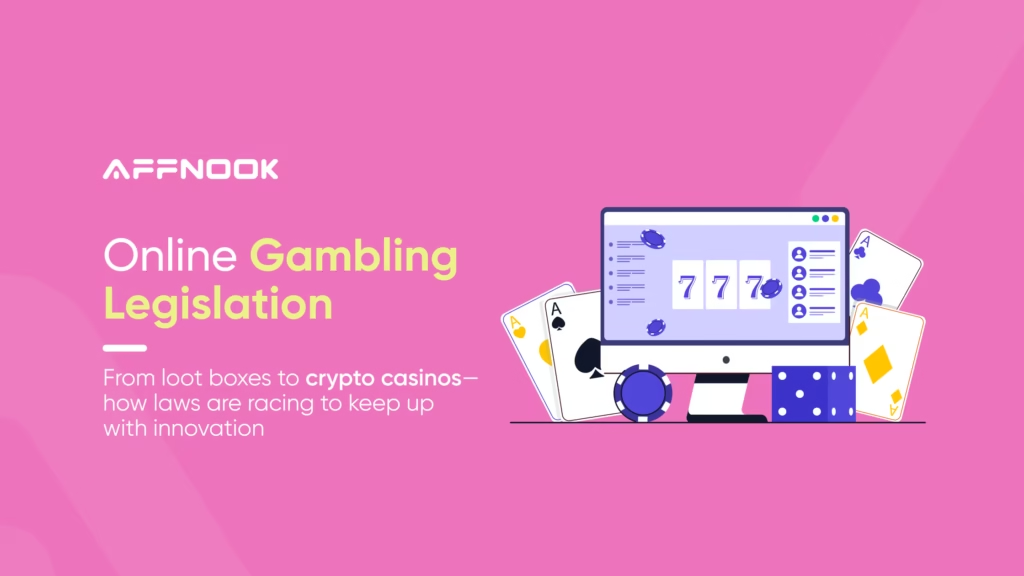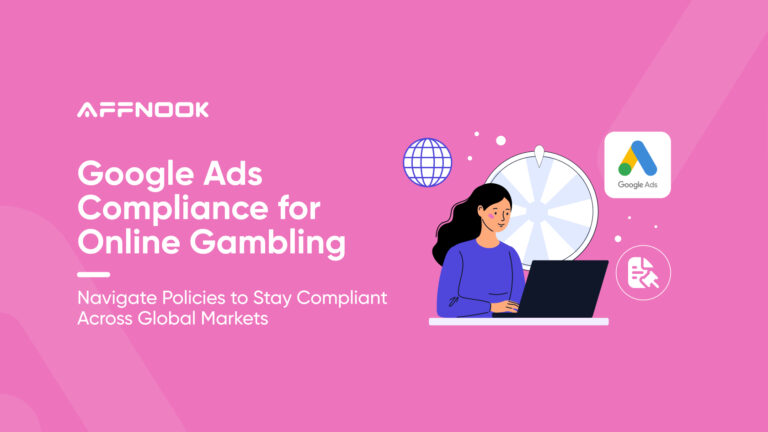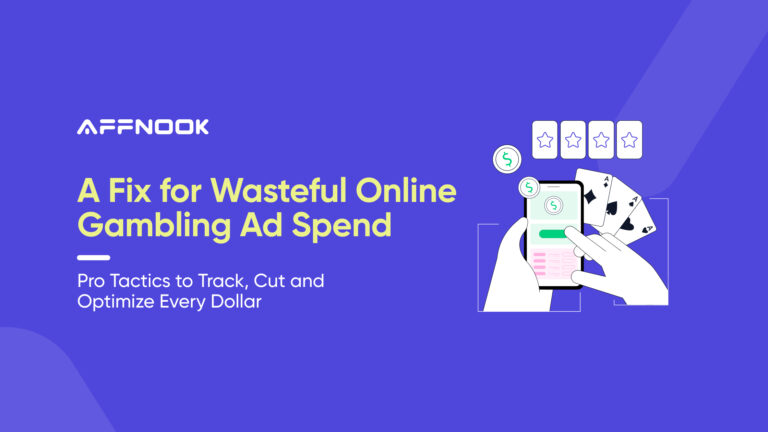Imagine you’re sitting at a coffee shop, sipping your morning latte. Around you, someone is opening a loot box on their phone, another is trading NFTs on a laptop, and someone else is excitedly talking about a win at a crypto casino.
It looks like everyday digital play, but actually, this is a new form of gambling—growing faster than the laws meant to regulate it. The challenge is that online gambling legislation hasn’t fully caught up with these new ways of playing and wagering.
Lawmakers are still unsure how to classify these new products: are they gambling, gaming, or investing? And the bigger question is, how do we keep players safe while still encouraging innovation?
The global online gambling market was valued at about USD 78.66 billion in 2024 and is expected to grow to USD 153.57 billion by 2030. A big part of this growth comes from new formats like esports betting, blockchain casinos, and in-game purchases.
Why Defining Gambling Has Become Complicated
For decades, gambling was simple to define. It needed three things:
- Money or value is put at risk
- An outcome based on chance
- A prize or reward
But today’s games don’t always fit neatly into these boxes.
- Loot boxes look like slot machines but are often sold as entertainment.
- Skin betting lets players wager in-game items with real-world value.
- NFT-based games blur the line between gaming and speculative trading.
- Crypto casinos challenge traditional banking and security rules.
This makes it difficult for regulators to decide when something is just play and when it becomes gambling.
Loot Boxes and Skin Betting: The Gray Area
Loot Boxes
Loot boxes have become one of the most debated topics in gaming and iGaming. They are virtual containers that players can open to receive random in-game items, such as rare skins, weapons, or other digital rewards. The controversy arises because players usually pay real money for a chance to get valuable items, making the mechanic very similar to traditional gambling.
Some countries, like Belgium and the Netherlands, have banned loot boxes entirely, considering them a form of gambling. Other countries, such as the UK, classify them as a consumer protection issue instead, focusing on transparency and responsible play rather than labeling them strictly as gambling.
Skin Betting
Skin betting takes this a step further. In games like CS: GO, players can wager in-game skins, which can have significant real-world value on the outcomes of matches or other games. Essentially, these digital items act like gambling chips.
The challenge is that many jurisdictions do not have clear legal rules on skin betting. This creates risks for players, who may lose large sums of money without the safeguards of regulated gambling, and for affiliates who promote these platforms, as they could unknowingly be involved in unregulated gambling activities.
Both loot boxes and skin betting highlight how online gambling legislation struggles to keep up with digital innovation. Regulators must balance protecting players from potential harm while allowing new gaming formats to thrive, creating a gray area that continues to evolve.
Cryptocurrency and Blockchain Casinos
Cryptocurrency and blockchain casinos are among the fastest-growing segments in online gambling. They attract players with unique benefits such as anonymity, instant transactions, low fees, and the ability to access games globally without traditional banking restrictions.
Blockchain technology also allows for provably fair games, where players can verify the fairness of outcomes through transparent algorithms.
However, this rapid growth brings serious regulatory challenges:
- Tracking transactions – Cryptocurrencies operate on decentralized networks, making it difficult for authorities to trace who is betting and where the money is going.
- Preventing money laundering – The anonymity of crypto can be exploited for illegal activities, which is a major concern for regulators worldwide.
- Ensuring fair taxation – Governments struggle to monitor and tax winnings and revenues properly in a decentralized system.
This is where online gambling legislation becomes critical. Countries are taking very different approaches:
- Malta and Gibraltar have embraced blockchain casinos, creating licensing frameworks that encourage innovation while maintaining oversight.
- China and India, on the other hand, block or heavily restrict these platforms, citing financial and consumer protection risks.
For affiliates and iGaming operators, this creates a complex, constantly changing landscape. Marketing a crypto casino legally in one country might be perfectly fine, but doing the same in another could lead to serious legal issues. This makes compliance a top priority for anyone involved in promoting or running these platforms.
NFTs and Play-to-Earn Models
NFTs and play-to-earn games, such as Axie Infinity, introduced the idea of true digital ownership in gaming. Instead of just playing for fun, users can earn tradable assets like characters, items, or land that can be bought, sold, or exchanged for real-world value. This shift has blurred the lines between gaming, investing, and gambling.
Regulators face a difficult question:
- If players invest money upfront to buy NFTs with the expectation of future profit, is that closer to investing in securities?
- If outcomes depend heavily on chance—like winning rare items or breeding valuable characters—does it fall under gambling laws?
- Or should it simply be treated as digital collecting, similar to trading cards?
The challenge lies in the fact that traditional gambling laws were never designed for digital assets and blockchain-based economies. Many play-to-earn games mix skill, chance, and speculation, making it hard for regulators to classify them neatly.
For example, a player might profit significantly from lucky NFT drops, while another may lose their investment due to market volatility—both resembling gambling risks.
This ongoing debate shows why modern online gambling legislation must evolve. Without clear rules, players face risks of fraud, market crashes, and unfair practices, while legitimate operators struggle with uncertainty about compliance.
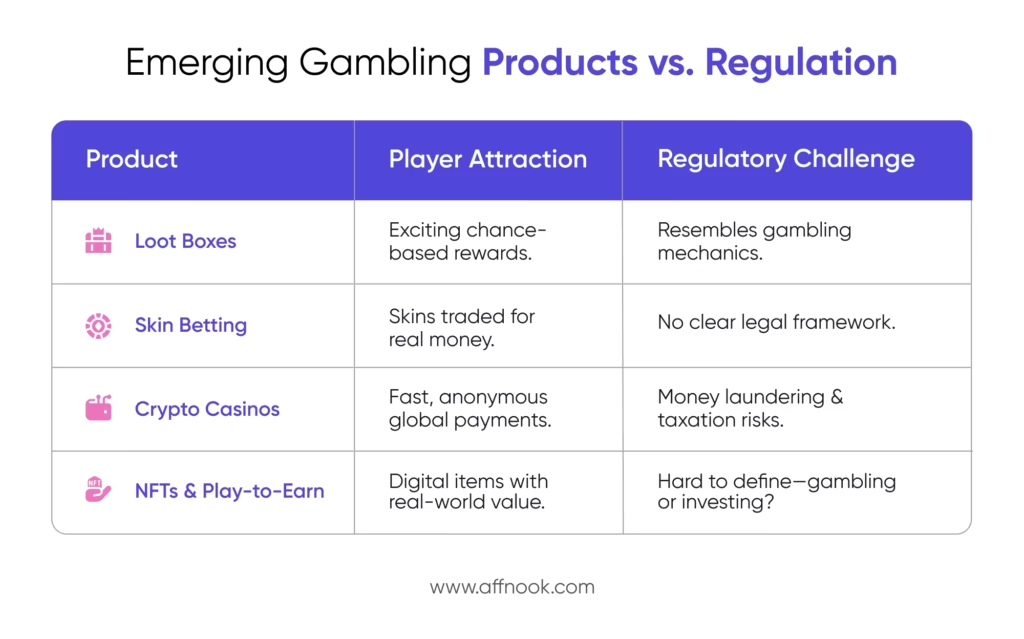
How are Different Regions Handling It?
When it comes to online gambling legislation, there’s no single global rulebook. Each country and sometimes each state has its own approach. This has created a patchwork of rules that players, affiliates, and operators must carefully follow.
- Europe:
- Belgium and the Netherlands banned loot boxes completely, calling them gambling.
- The UK doesn’t see loot boxes as gambling but as a consumer issue.
- Malta has embraced blockchain casinos with clear regulations, making it a hub for innovation.
- North America:
- In the United States, gambling laws change from state to state. For example, it’s legal in New Jersey but banned in Utah. Crypto casinos mostly remain unregulated here.
- Canada allows provinces to set their own rules—Ontario is leading with a regulated online gambling market.
- Asia:
- China and India have some of the strictest bans on online gambling, including crypto casinos. But players still access offshore platforms.
- The Philippines allows licensed online gambling and earns big tax revenue from it.
- MENA Region:
- Most Middle Eastern countries ban gambling due to cultural and religious reasons. But with crypto and NFTs, enforcement is tricky, and gray areas are appearing.
In short, there’s no one-size-fits-all rule. Affiliates and operators must adjust to different laws in each region, while players often struggle to know what’s legal or safe in their country.
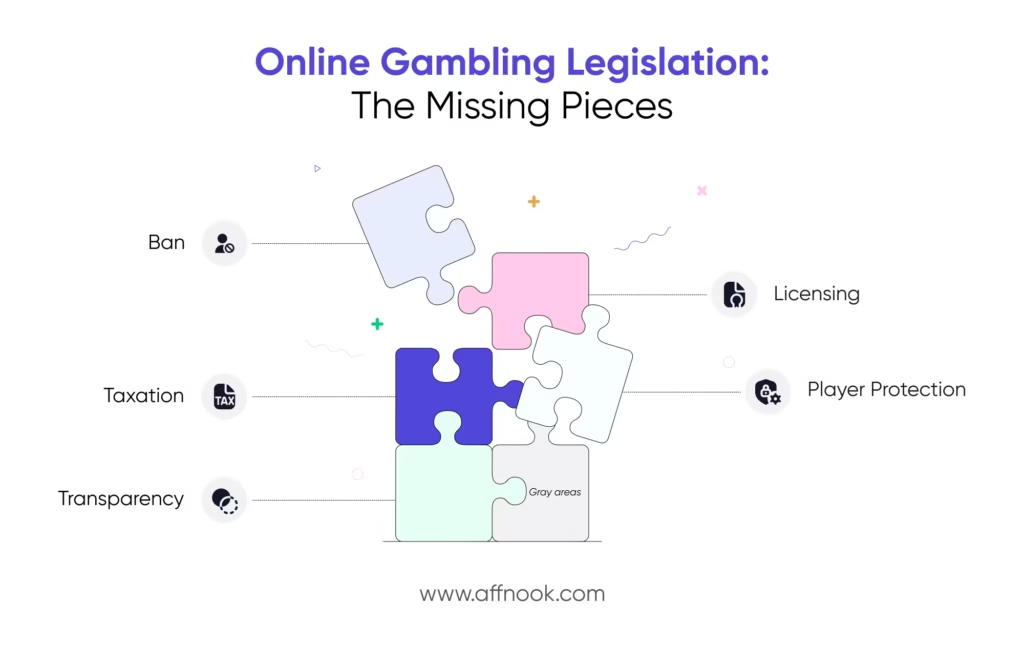
Why Affiliates and Operators Matter in This Debate
When we talk about online gambling legislation, it’s easy to focus only on regulators. But affiliates, operators, and marketers are just as important in shaping how the industry grows.
- Affiliates: They drive players to iGaming platforms, so they need clarity on what promotions and campaigns are legally allowed. A lack of rules can put them at risk of penalties or lost revenue.
- Operators: They’re the ones creating and running new formats—whether it’s loot boxes, crypto casinos, or NFTs. To stay in business, they must adapt their products to match the local laws in every region they operate.
- Marketers: They sit at the middle ground, responsible for building player trust. By promoting transparency, fair play, and responsible gambling features, marketers can show regulators that the industry is serious about protecting players.
Platforms like Affnook make this easier by offering tools like structured data feeds, API integrations, and compliance-focused solutions that help affiliates work smoothly across markets.
Finding the Balance: Innovation vs. Protection
When it comes to online gambling legislation, finding the right balance is tricky. If there’s too much regulation, innovation slows down, and players may move to unregulated, unsafe sites. If there’s too little oversight, players face risks like fraud, addiction, or unfair games.
The goal is to strike a balance where new ideas can grow while players remain safe. Some best practices that help include:
- Transparent loot box odds – Players should know the chances of winning items.
- Strong KYC and AML checks – Especially for crypto casinos, to stop fraud and money laundering.
- Responsible gambling tools – Features like deposit limits and self-exclusion give players more control.
- Open dialogue between regulators and industry – Collaboration ensures rules are practical and fair.
By following these steps, the industry can encourage innovation without compromising player safety.
Conclusion
New formats like loot boxes, NFTs, and crypto casinos are reshaping iGaming, but they’ve also created big challenges for lawmakers. The definition of gambling is expanding, and legislation is racing to catch up.
For affiliates and operators, adaptability is the key to survival. Those who stay informed and compliant will thrive. By working with platforms like Affnook, businesses can stay ahead of shifting laws and continue to grow in a market where the rules are still being written.
Help Section
How does online gambling legislation impact the launch of new game formats?
Online gambling legislation directly affects how new game formats—such as loot boxes, crash games, and skill-based slots—are introduced in the market. In regulated jurisdictions, operators must ensure that these products comply with licensing conditions, responsible gambling requirements, and technical standards. Non-compliance can result in heavy fines or loss of operating licenses, making legal adaptation a top priority for iGaming brands.
What challenges do iGaming operators face when adapting to evolving online gambling legislation?
Operators face challenges such as:
Uncertainty surrounds new formats, such as crypto casinos or esports betting, where laws are still developing.
To stay competitive, operators often rely on compliance tools, data-driven monitoring, and third-party platforms that simplify cross-market integration.
Compliance costs for updating platforms and products.
Jurisdictional differences, where rules vary across markets like the EU, US, and Asia.
Why are responsible gambling tools important under online gambling legislation?
Responsible gambling tools are now a legal requirement in most regulated markets. Features like deposit limits, time-outs, and self-exclusion not only protect players but also demonstrate compliance with legislation. For iGaming brands, offering robust responsible gambling tools builds trust, reduces regulatory risk, and strengthens long-term customer loyalty.
How do global regulators view innovative products like loot boxes and crypto casinos?
Regulators worldwide have mixed views:
Crypto casinos face strict scrutiny around AML (Anti-Money Laundering) and KYC (Know Your Customer) checks.
Some regions, like the EU, lean toward stricter oversight, while others allow more flexibility. This fragmented regulatory landscape means operators must adapt products differently depending on where they operate.
Loot boxes are increasingly being classified as gambling products, requiring disclosure of odds.
What best practices help iGaming operators stay compliant with online gambling legislation?
Best practices include:
Maintaining open communication with regulators to anticipate changes.
By following these practices, operators reduce legal risks and can scale smoothly across multiple jurisdictions.
Conducting regular compliance audits.
Using structured data feeds and APIs for accurate market reporting.
Partnering with compliance-focused platforms to streamline regulatory updates.
